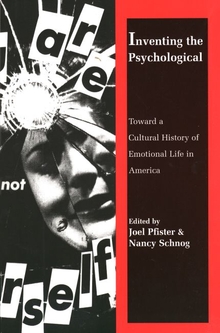Inventing the Psychological
WARNING
You are viewing an older version of the Yalebooks website. Please visit out new website with more updated information and a better user experience: https://www.yalebooks.com
Toward a Cultural History of Emotional Life in America
Edited by Joel Pfister and Nancy Schnog
In this fascinating book, distinguished interdisciplinary scholars show that the ways Americans imagine "innerness" and emotions have been shaped by mass media, economics, domesticity, and the arts. The authors investigate how changes in ideologies of the family, class, race, gender, and sexuality over the past two centuries relate to shifts in Americans' visions of self and psyche; they study "the psychological" as a changing cultural category and "emotions" as historically shifting self-definitions. Their compelling topics include how the Romantic idea of "moods" was appropriated by nineteenth-century female authors of sentimental fiction; how black jazz musicians have responded to white interpretations of African-American jazz as emotionally and aesthetically "deep"; and whether women's confessions of victimization on the Oprah Winfrey Show are akin to 1970s feminist consciousness-raising groups. Provocative and timely, the book challenges the premises of psychohistory and the dominant ways in which Americans have been taught to conceptualize the making of psychological and emotional life.
"Inventing the Psychological helps to consolidate and define an important new subfield of U.S. cultural history. Setting out from different disciplines, the contributors converge around modern ideas of human nature and selfhood—imagined as founded upon deep psychological inferiority—and subject them to critical and historical scrutiny. There is stimulating reading to be found in this volume."—Michael Leja
"The majority of the authors are scholars in English and/or American Studies, though other disciplines are represented, e.g., anthropology, history, musicology, women's studies. The articles adopt a poststructuralist framework, but the editors have seen to it that the writing is accessible and largely jargon-free, hence a broad spectrum of readers should find this book interesting."—Choice
"The essays in this collection are insightful, provoking and very useful in the study of American and human society."—Michael Schoenecke, Journal of American Culture
"This stimulating collection focuses on explaining what the increasing fascination with psychological emphases has been in American culture, and in some cases why the fascination developed. . . . The volume is a welcome, dynamic addition to the increasing variety of approaches available for the history of emotion. If the cultural history portion of the title gains more emphasis than actual emotional life, the book nevertheless contains important statements about the context, dissemination, and utilization of psychology in the United States."—Peter N. Stearns, Carnegie Mellon University, Journal of the History of Behavioral Sciences
"Useful and provocative collection. . . . Inventing the Psychological opens up a wide and fertile field of our contemporary common sense for further study and critique."—Fred Pfeil, American Quarterly
"Inventing the Psychological crystallizes, and will dramatically advance, an important new agenda of historical and literary study. Emotional life appears to stand outside history--seeming a universal touchstone of moral reality and personal authenticity—by virtue of an ideological dynamism so powerful that scholars have found difficulty standing apart from it, to see it, and to see how it works. The theoretical essays of Pfister and Schnog conquer this difficulty. [The] volume illustrates the wide range of exciting new work that becomes feasible when emotional realities are recognized as historical creations."—T. Walter Herbert
"A fascinating and far-reaching collection. . . . Beginning with the editors’ tour de force introductions, one is plunged into a richly historical and conceptually sophisticated series of essays treating such diverse topics as how changes in economics, domesticity, and immigration prepared America for its adulterous reception of Freudian psychoanalysis. . . . There is much to be excited about in this terrific volume. For the range and detail of its cultural history, for the thoughtful and nuanced (but always accessible) use of poststructuralist theory, for its exciting connections between privileged social institutions and mass popular culture (the book moves from nineteenth century parenting manuals to Dr. Spock, from Joni Mitchell to Prozac and new age spiritualism), and above all for the important field of cultural history it opens up and the compelling models of inquiry it provides, Inventing the Psychological is a ‘must read’ for any serious student of American culture."—Christopher Castiglia, American Literature
"While numerous critical studies have sought to elaborate upon aspects of the history of subjectivity, Inventing the Psychological stands apart for its careful examination of fields of scientific inquiry—psychology, psychiatry, psychoanalysis—that have until recently been largely unexplored. Combining fresh interpretations of canonical texts such as Tom Sawyer and Freudian psychoanalysis with rigorous historical perspectives on discourses as varied as depth psychology and military science, the volume offers exemplary instances of scholars working across the literature/science divide."—Maria M. Farland, Modern Language Notes
"This volume is a significant contribution to our understanding of the ‘psychological’ as a historically contingent, gendered, and contested domain of experience."—Kevin Browne, Journal of American & Comparative Culture
Publication Date: February 27, 1997
24 b/w illus.


